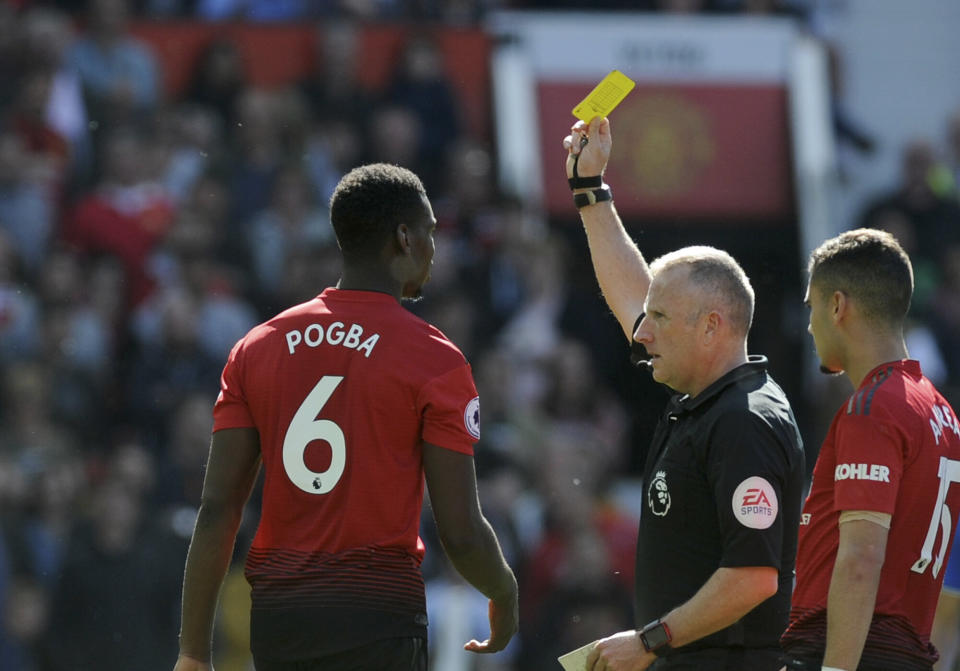Here are the 5 biggest problems at Manchester United right now
It’s hard to feel sorry for Manchester United fans, given the unrivaled success they have enjoyed in the past two decades. The post-Ferguson era has been a sobering experience for the Red Devils, however, and the 2018-19 campaign represents another failure to get back on track.
With Ole Gunnar Solskjaer at the wheel, United closed out the season with eight losses from their final 12. If the season started when the Norwegian was given the permanent role, United would have finished 15th.
It seems they have the mother of all rebuilds on the horizon this summer.
Here’s the five biggest problems facing the Premier League’s most historically successful side right now.
1. Red Devils have no ‘philosophy’
In the past few seasons, both clubs in Manchester have spent eye-watering amounts of money in their quest for glory. The side who play in sky blue have retained the title for the second season and look virtually unstoppable. But the side who play in red are playing some of the least inspiring soccer Old Trafford has ever seen.
Besides a few miles of road and 32 league points, what separates the two sides?

A sporting philosophy.
When the Abu Dhabi United Group took the reigns at Man City in the summer of 2008, Sheikh Mansour and chairman Khaldoon Al Mubarak deliberately chose to impose a sustainable business model, employing specific top-level executives to ensure success came through a particular style on the field. During Pep Guardiola’s prime at Barcelona, sporting director Txiki Begiristain (who played alongside Pep for the Blaugrana under Johan Cruyff) brought in players such as Yaya Toure, Eric Abidal and Dani Alves. Barca vice president Ferran Soriano, meanwhile, made sure those contracts were signed by getting the Spanish giants’ finances in order.
Both Begiristain and Soriano were brought to City to implement their tried-and-tested model of success through beautiful Cruyffian soccer.
The kind of players and managers who were brought in to City all worked toward that vision, which was arguably designed to lay the groundwork for Guardiola’s eventual arrival.
Contrast this long-term planning and joined-up thinking with United, whose executive vice chairman Ed Woodward has sanctioned many high-profile signings without any interest in whether they fit into a particular system.
As a result, there have been four managers since Sir Alex Ferguson’s departure, and the squad is a messy hodgepodge of players demanded by each.
Unlike City, United have no philosophy. They do not know what they are on or off the field. They have no long-term strategy, besides attracting official diesel engine partners in the far east.
2. Their squad isn’t good enough
The lack of philosophy leads to the second issue: United’s squad is an incoherent mess — and many players simply aren’t good enough.
To illustrate the point, here’s a useful exercise: take a look at the starting XI that failed to beat relegated Cardiff on the final league game of the season:
De Gea
Dalot-Smalling-Jones-Young
Pereira-McTominay-Pogba
Greenwood-Lingard-Rashford
How many of those players would make it into Manchester City’s team? The answer is none.
How many would make it into Liverpool’s starting XI? Probably none.
How about the Chelsea XI? You’re getting the picture.
Manchester United have spent £687M on signings since Ferguson’s departure, but their team is incredibly underwhelming for a side that would, at the very least, expect to challenge the top four.
The Red Devils were famous for putting their faith in youth, prompting the immortal line “You’ll never win anything with kids,” from BBC pundit Alan Hansen at the start of a season where the class of ‘92 won the title.
These days, however, United’s is far from the best academy in Manchester and they seem unable to put their tremendous financial resources to good use in the transfer market. The current squad is mostly a mess of signings from different managers, along with “statement” signings like Paul Pogba, whose presence may have more to do with marketing than man marking (that’s certainly the case for the manner in which the Frenchman failed to track his man for Cardiff’s second goal last weekend).
Note how Manchester City have not used their resources to sign a Pogba or a Neymar. They have simply purchased the best players for the job, without concern for how they can help the club attract global sponsorship deals.
And think of how much money has been squandered in the past six seasons: Angel Di Maria, Radamel Falcao, Victor Valdes, Memphis Depay and Bastian Schweinsteiger are among the failed experiments who have come and gone.
United’s poor squad is a direct result of poor performances at the executive level. Which leads to the next issue ...
3. United will struggle to offload unwanted players
Ed Woodward is, by all accounts, excellent in his role in boosting the bottom line. But the former accountant has been in charge of sanctioning transfers — which is a big reason for the mess they currently face.
United have never had a technical director or director of football: someone with experience of the game, who can work with the manager and help bring in players who fit the “culture” of the club.
Instead, they have a businessman whose recruitment decisions may be informed by prospective shirt sales, rather than suitability to the squad.

As a result, they have a player like Pogba, who United had to buy back from Juventus at great expense after giving him away for free. Since his return, Pogba has been maligned by one of his managers (Jose Mourinho) and has failed to reach the standard he showed in Serie A.
And United also have Alexis Sanchez, who has been earning around £475,000 per week, despite being a shadow of his former self. The Chilean is under contract until summer 2022 and there is speculation they will have to pay half his astronomical wages just to get someone to take him on loan. Will anyone be crazy enough to take him, even paying 50 percent of his wages? Or will United have to simply continue with the embarrassing spectacle of their best-paid player getting nowhere near the starting XI?
Meanwhile, Phil Jones, Luke Shaw, Diego Dalot and Fred are all under contract until 2023. The latter is reportedly on £120,000 per week — who is going to match that if United want to let him go? Who would take someone like Jones in the event of a defensive rebuild?
If United want to completely revamp their team, they are in a terrible position to negotiate because they pay so much, and clearly have issues with contract management. Offloading players will prove to be an incredibly tricky task.
4. Solskjaer isn’t good enough
When Solskjaer was appointed as interim manager following Mourinho’s departure, it seemed all their problems were solved. They went on a 12-game undefeated streak in the league, and against all expectation, they managed to topple Paris Saint-Germain in the Champions League. Hurrah!
When the “new manager bounce” wore off, however, reality set in. United were in sixth position when Mourinho left and that’s where they have ended up.
While Solskjaer is an incredibly likable character who will always enjoy legendary status at United for his late nineties “Super Sub” exploits, his previous managerial experience extends only to the Norwegian Tippeligaen. In the past few weeks, the “Baby-faced Assassin” appears to have aged 20 years as the pressures of the job pile upon him.
Granted, Barcelona took a risk on a former player with little experience when they hired Guardiola as coach, but it seems that Solskjaer might not have the same magic touch.
If United truly want to compete with their counterparts, they also need an elite manager. In spite of giving the full-time gig to the Norwegian in March, it would be in their best interests to employ someone who can be relied upon to oversee the rebuild. The best candidate is the man who was expected to be offered the job before Solskjaer’s interim role became permanent: Mauricio Pochettino.
With next to no budget, the Argentine has revolutionized Tottenham and brought them to a Champions League final. If they win that game, Poch will have the perfect opportunity to step away and start a fresh challenge. And if they lose, United should move hell and high water to try and bring him to Manchester. The temptation of a massive war chest — something he doesn’t have in North London — might be enough to lure him.
If Poch won’t budge, then United should look elsewhere for an elite option: Max Allegri or Diego Simeone are the perfect calibre for a club with their lofty aspirations.
Frankly, if United want to be a big club, they need to start behaving like one. Which leads to the final issue ...
5. Man United are no longer a ‘big club’
The non-elite manager, the lack of philosophy and the underwhelming squad all point to a startling fact: Manchester United are no longer a big club.
Sure, they’re big in terms of financial clout, supporter base and legacy, but nothing about the actual team and the way it is run suggests they belong with the big boys.
Solskjaer has sensibly ruled out a title challenge next season and in the current climate, it is difficult to see this group of players even cracking the top four.
Unless there are huge changes in structure and personnel — and unless some intangible magic starts occurring on the field — United are destined to spend time in the wilderness.
After all, in the seasons after Sir Matt Busby left United, they struggled. In fact, three seasons after his departure in 1971, they were relegated from the top flight. It seems the same kind of post-dynasty issues surround Old Trafford today.
Relegation may not be on the cards, but it could be some time before this team start challenging for silverware again.
More from Yahoo Sports:


